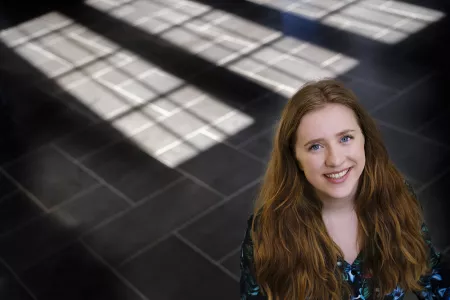The Belfer Center's Arctic Initiative is pleased to welcome Guðbjörg Ríkey Th. Hauksdóttir as a 2023-2024 Research Fellow. A scholar of Arctic politics, Chinese foreign policy, and small state security, Hauksdóttir will contribute to the Initiative's work on Arctic governance, cooperation, and diplomacy.
She joins a cohort of 67 new Fellows representing senior government officials, practitioners, and academics from across the globe.
Hauksdóttir sat down with Tessa Varvares, Arctic Initiative Project Coordinator, to talk about her research and her plans for the upcoming year.

Welcome to the team, Ríkey! You have significant experience analyzing China’s foreign policy. What first drew you to this topic?
I first became interested in China’s foreign policy while I was in Shanghai as an undergraduate student in Chinese studies. I fell in love with the Chinese language, which opened a whole new world to me, including that of politics and foreign policy.
This was also during a time in which Iceland, my home country, was increasing its relations with China, including the two countries signing a Free Trade Agreement, China opening up a research station in the Northeast of Iceland, and not to mention China becoming an Observer in the Arctic Council. So, this was a time when China was increasingly becoming more prominent in Arctic politics.
What will be your primary area of research while you are at the Belfer Center?
My main area of research is China-Russia cooperation in the Arctic. I am working on mapping out to what extent the two states are cooperating in the Arctic and the main drivers of and barriers to their cooperation. I am also examining how we can conceptualize their relationship: is it, as often mentioned in the Arctic context, a ‘marriage of convenience’ or is the relationship driven more by short-term interests?
After Russia’s invasion of Ukraine in 2022, it is becoming more evident that broader geopolitical developments cannot be left ‘outside’ of the Arctic region. Therefore, I am analyzing the impact the China-Russia cooperation has on other Arctic states’ policies, specifically the United States and Iceland.
What led you to pursue a fellowship at the Arctic Initiative?
My first exposure to the Arctic Initiative was actually as a graduate student of international relations, when I participated in the Arctic Initiative’s Innovation Lab at the Arctic Circle Assembly in Reykjavík. It was really an interesting experience, and I was just so impressed with everyone’s innovative ideas.
Later, I was a Project Manager at the Center for Arctic Studies at the University of Iceland’s Institute of International Affairs. Together with the Arctic Initiative, Ilisimatusarfik (the University of Greenland), and The Arctic University of Norway, we launched the Arctic Academy for Social and Environmental Leadership (ARCADE).
So before applying for the fellowship, I already had the privilege of working with the Arctic Initiative and knew what sort of focused, driven, and wonderful people are on the team. I feel very honored to be joining them.
What are you looking forward to during your time as a fellow?
I am most looking forward to getting to work more closely with the Arctic Initiative team. It has already been a pleasure getting to know the people on the team, so I am very excited for the year ahead. The Arctic Initiative team is highly experienced and very driven, so it will be wonderful to collaborate with team members on projects concerning Arctic geopolitics and governance.
I am also looking forward to experiencing the fellowship life at the Belfer Center, which already has been very uplifting and inspiring. Both the Arctic Initiative team and the Belfer Center have made me feel most welcome.
